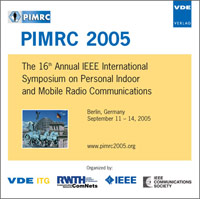Capacity of Time-Varying Rayleigh Fading MIMO Channels
Konferenz: PIMRC 2005 - 16th Annual IEEE International Symposium on Personal Indoor and Mobile Radio Communications
11.09.2005 - 14.09.2005 in Berlin, Germany
Tagungsband: PIMRC 2005
Seiten: 5Sprache: EnglischTyp: PDF
Persönliche VDE-Mitglieder erhalten auf diesen Artikel 10% Rabatt
Autoren:
Zhao, Yifei; Zhao, Ming; Xiao, Limin; Wang, Jing (Dept. of Electronic Engineering, Tsinghua University, Beijing 100084, PR China)
Inhalt:
In this paper, we investigate the capacity of continuously time-varying multiple-input multiple-output (MIMO) systems in frequency-flat Rayleigh fading environment with perfect interleaving. By introducing the Gauss-Markov model to describe the channel variation and employing minimum mean square error (MMSE) channel estimation based on the pilots, we derive very tight lower and upper bounds of the ergodic capacity in closed-form. We also derive the optimal power allocation between the pilot and data vectors, which maximize the lower bound of the ergodic capacity. Interestingly, the optimal allocation is independent of the channel variation parameter and can be easily computed (no feedback is required). The optimal training interval can be obtained via numerical optimization. Finally, two different transmit schemes are compared via simulation. It is shown that, in fast fading or high SNR environments, the scheme with optimal power allocation almost has the same performance as the scheme with equal power allocation. However, in slowly fading or low SNR environments, the former has much better performance than the latter.


